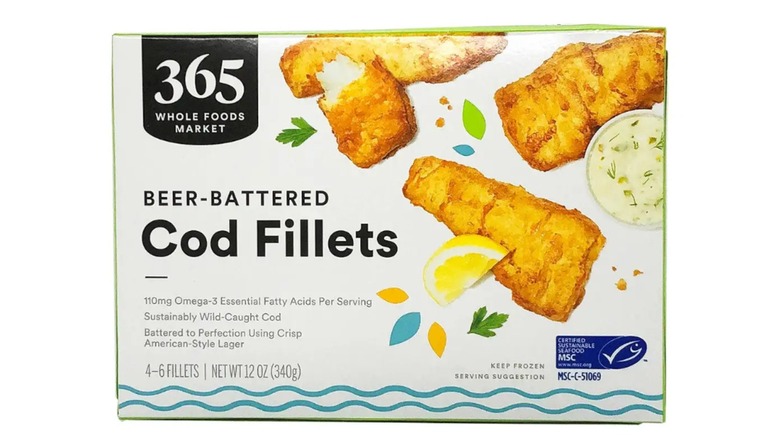Whole Foods Fish Fillets Recalled Due To Undeclared Soy
If you are a Whole Foods shopper, take note of a new product recall. Beer-battered cod and pollock filets packaged under the Whole Foods 365 brand were voluntarily recalled by their manufacturer, Tampa Bay Fisheries, on December 21 because a soy ingredient in specific lots was not listed on the packaging. Per UCSF Health, those who are allergic to soy may experience reactions such as swelling of the tongue, lips, or mouth, vomiting, abdominal pain, and respiratory difficulties after consuming it. Severe cases may be fatal.
The Food and Drug Administration (FDA) recall announcement states the affected pollock is from lot 32508201 with a best-by date of March 7, 2025. The recalled cod is from lot 32348201, best by February 22, 2025, and lot 32628201, best by March 19, 2025. The fish was sold from September 8, 2023, through Friday, December 21, 2023. If you've purchased beer-battered fish from Whole Foods in that period, check the lot and dates on the back and sides of the packages. Fish from the recalled lots should be discarded, and if you have the receipt, Whole Foods will refund the price.
Allergen labeling is key for food safety
Tampa Bay Fisheries bills itself as a top supplier of private-label breaded and processed fish products from countries around the world. The FDA recommends contacting the company directly if you have questions about the recall at 800-SEAFOOD during business hours, Monday through Friday. Currently, it's unclear how the allergen miss was discovered.
Soybeans are one of eight major allergens required to be declared on food packaging by the Food Allergen Labeling and Consumer Protection Act of 2004. (In 2021, updated legislation added sesame to the list, bringing the total to nine.) The FDA regulates package labeling and inspects food companies to ensure proper procedures are in place to avoid cross-contamination of allergens and improper labeling, but mislabeled processed food is still the major cause of food recalls, according to an analysis published by Quality Assurance & Food Safety Magazine. Fortunately, no illnesses have been reported so far due to this labeling error.

